外研版(2019)必修第一册Unit 5 Into the wild Using language 语法 课件(共25张PPT)
文档属性
| 名称 | 外研版(2019)必修第一册Unit 5 Into the wild Using language 语法 课件(共25张PPT) |

|
|
| 格式 | pptx | ||
| 文件大小 | 1.1MB | ||
| 资源类型 | 教案 | ||
| 版本资源 | 外研版(2019) | ||
| 科目 | 英语 | ||
| 更新时间 | 2024-07-01 00:00:00 | ||
图片预览

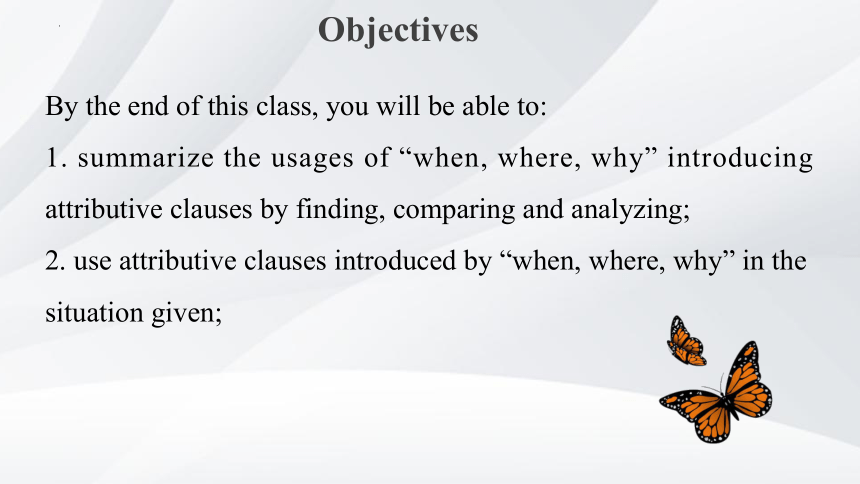
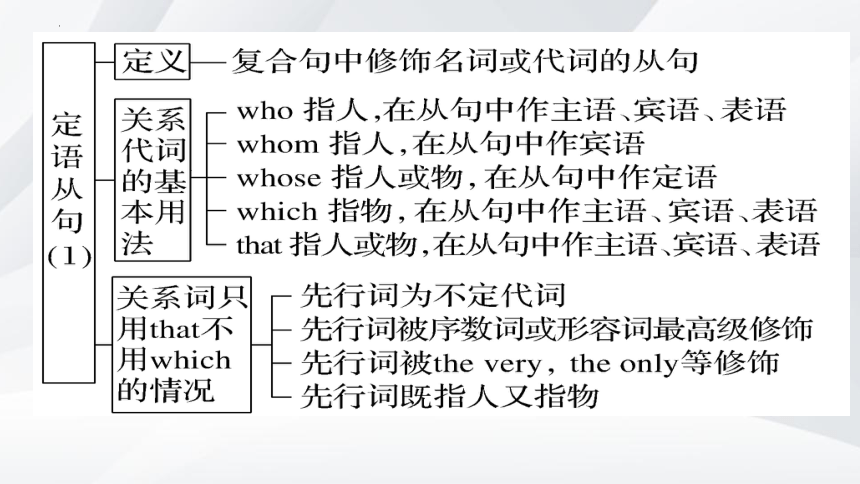
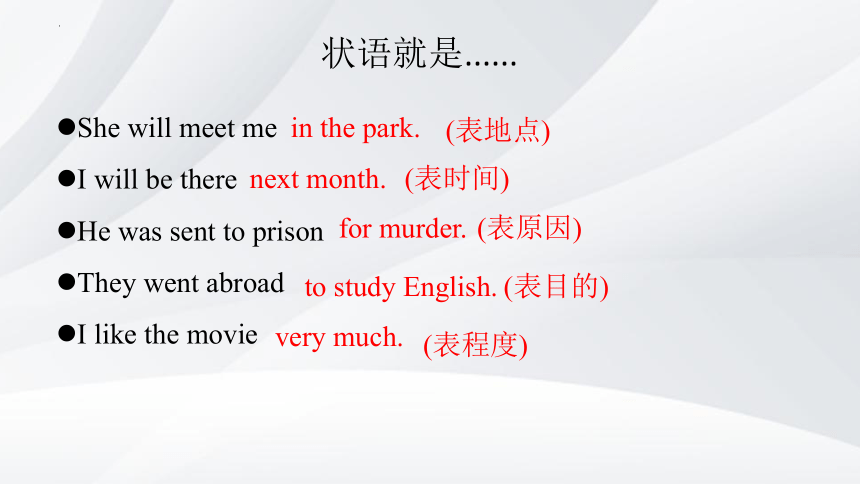
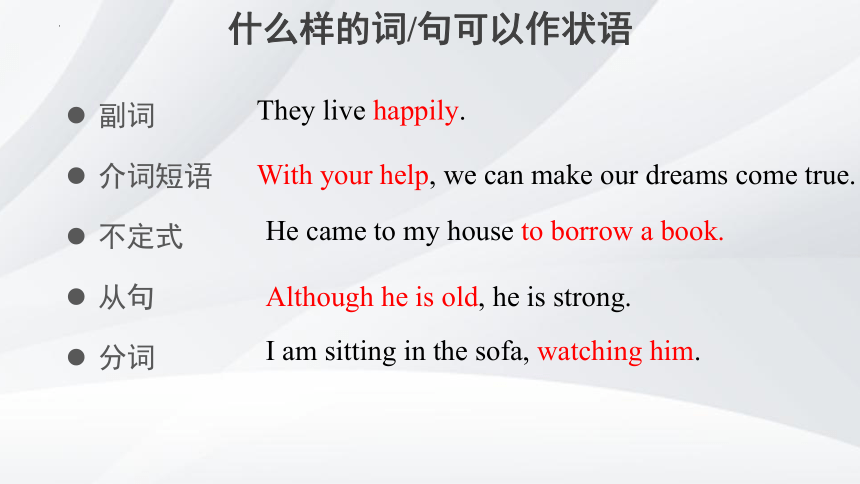
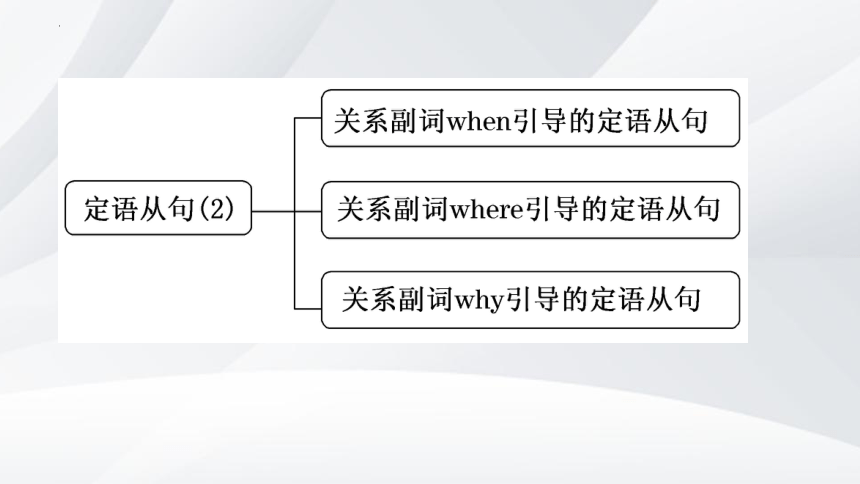
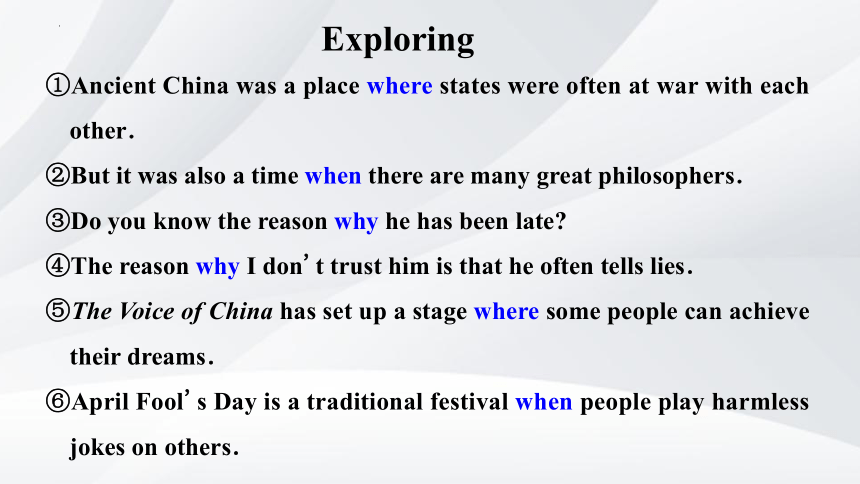
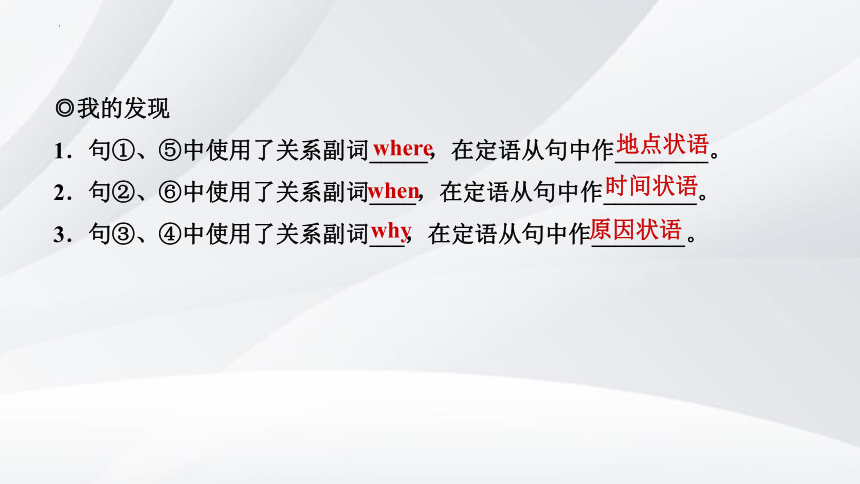

文档简介
(共25张PPT)
Unit 5 Into the wild
Using language
Objectives
By the end of this class, you will be able to:
1. summarize the usages of “when, where, why” introducing attributive clauses by finding, comparing and analyzing;
2. use attributive clauses introduced by “when, where, why” in the situation given;
状语就是......
She will meet me
I will be there
He was sent to prison
They went abroad
I like the movie
in the park.
next month.
for murder.
very much.
to study English.
(表地点)
(表时间)
(表原因)
(表目的)
(表程度)
什么样的词/句可以作状语
副词
介词短语
不定式
从句
分词
They live happily.
With your help, we can make our dreams come true.
He came to my house to borrow a book.
Although he is old, he is strong.
I am sitting in the sofa, watching him.
①Ancient China was a place where states were often at war with each other.
②But it was also a time when there are many great philosophers.
③Do you know the reason why he has been late
④The reason why I don't trust him is that he often tells lies.
⑤The Voice of China has set up a stage where some people can achieve their dreams.
⑥April Fool's Day is a traditional festival when people play harmless jokes on others.
Exploring
◎我的发现
1.句①、⑤中使用了关系副词_____,在定语从句中作________。
2.句②、⑥中使用了关系副词____,在定语从句中作________。
3.句③、④中使用了关系副词___,在定语从句中作________。
where
地点状语
when
时间状语
why
原因状语
一、关系副词的指代及功能
关系副词 先行词 功能
when 表示时间的名词 时间状语
where 表示地点的名词 地点状语
why reason 原因状语
二、关系副词的基本用法
1.when引导定语从句时,先行词为表示时间的名词,关系词在从句中作时间状语。
Do you know the date The camera records the time when we have to hand in the essay
when the photo is taken.
二、关系副词的基本用法
2.where引导定语从句时,先行词为表示地点的名词,关系词在从句中作地点状语。
After living in Paris for fifty years, he returned to the small town where he grew up as a child.
where还可用在表示抽象意义的地点名词后,如situation, stage, point, case, position, condition等。
They are in such a situation where everything is out of order.
The police are looking into the case where two VIPs were killed.
They were some occasions where we have to tell some white lies.
二、关系副词的基本用法
3. why引导定语从句时,先行词通常是reason, 关系词在从句中作原因状语。
Unsuccessful people can always find reasons why they’re not doing well.
先行词是the reason时,定语从句的引导词需根据定语从句缺少的成分而定。如果缺少状语,用why;如果缺少主语或宾语,则用that/which,作宾语时可省略。
I don’t believe the reason he gave for his being late.
我不相信他给出的迟到的理由。
(that/which)
Grammar summary
Preposition + which:
Do you know the date I would like to live in a place That is the reason on which we have to hand in the essay
in which there is plenty of sunshine.
for which I left.
when、where和why都可以替换成“介词 + which”,介词的选用取就于先行词和定语从句中的动词。
对比填空:that, which, when, where, why
①I still remember the time when I first travelled by plane.
②The reason that/which he explained at the meeting was not sound.
③Among the many dangers that/which sailors have to face,probably the greatest of all is fog.
④Can you tell me the reason why you didn’t come to his birthday party
⑤I’d like to live in the house where there is plenty of sunshine.
⑥This is the house that/which was built by my grandfather forty years ago.
⑦The hotel where we stayed yesterday was very clean.
when
that/which
that/which
why
where
that/which
where
Practice
Read the passage and fill the blanks with where, when, and why refer to.
In April 2017, two giant pandas from China arrived at a zoo in the Netherlands. There, they were welcomed to the Chinese-style compound they were to live. On 30 May, after the preparations were complete, the day finally came the pandas met their fans for the first time. People were excited – the zoo is the only place in the country it is possible to see pandas. In fact, the last time there were pandas in the Netherlands was in 1987. And of course, the main reason they were so excited is that pandas are just so cute!
where
where
when
why
Practice
Complete the email with where, when or why.
From
David Waters
To
Kay Silverman
Hi Kay,
We’re having an amazing time here in South Africa. Our accommodation is perfect. It is in a location 1. ________ we can watch animals wandering past on their way to the waterhole. Sunset is the time of day 2. ________ we sit on the balcony and count how many giraffes or antelopes we can see. I guess this is the reason 3. ________ this place is so popular. Next week, we are going to fly up to Zambia. That’s one of the countries 4. ________ you can visit the famous Victoria Falls.
See you soon.
David
where
when
why
where
Back to nature
Subject
用适当的关系词完成下面短文
Tai Dong is a small city in south-east Taiwan 1. where I grew up.My family moved there from Taipei the summer 2. when I was born. The house 3. where I grew up was on a main street in Tai Dong. It was a nice house with a big garden 4. where there were a lot of nice flowers. My father sold tea,and my mother had a small restaurant 5. where there were always many customers. A cousin of mine 6. whose family I visited every summer lived with us. He was an apprentice (学徒) 7. who/whom/that my father was teaching the tea business to. On the first floor of our house,we had a huge kitchen 8. where we all gathered for dinner. I will never forget the happy days 9. when we were eating and talking happily. The bedrooms were upstairs. My brother and my cousin slept in one bedroom. I slept in another 10. which/that I shared with Polly,the smartest bird that I had ever seen.
where
when
where
where
where
whose
who/whom/that
where
when
which/that
Animal idioms
Look at the pictures and complete the idioms with animal names.
1
2
3
4
5
1. as busy as a (n) _____
2. kill two ______ with one stone
3. When the cat’s away, the _____ will play.
4. hold your ______
5. It’s raining ______ and ______.
bee
birds
mice
horses
cats
dogs
Animal idioms
Complete the paragraph with the animal idioms from above.
English idioms are a way of adding colour to the language. For example, instead of saying “It’s raining heavily”, you could say “1.____________________”. Another reason to use idioms is that they are concise. For example, to describe someone who is always working or busying doing something, we can say they are 2.______________. If they’re rushing into something and should wait and be patient, you could say “3.______________”. Learning idioms can be fun, especially when we compare them to Chinese equivalents. Take, for example, “4. _____________________________” (people do what they want and have fun when someone in authority is absent) and “5._____________________” (solve two problems with one action) —are there corresponding idioms in Chinese
It’s raining cats and dogs
as busy as a bee
hold your horses
When the cat’s away, the mice will play
kill two birds with one stone
Animal idioms
Love me, love my dog.
Don’t ride the high horse.
Never offer to teach fish to swim.
Fine feathers make fine birds.
爱屋及乌。
勿摆架子。
不要班门弄斧。
人靠衣装;佛靠金装。
Guess the meanings of the following idioms about animals.
Talking
Do you think we should keep animals as pets
Work in pairs. Hold a debate.
Student A:
You are in favour of keeping animals as pets.
Student B:
You are against keeping animals as pets.
Keeping pets develops a kind and caring attitude towards animals.
Keeping pets is good for people’s physical and mental health.
Keeping pets helps people know more about animals.
Caring for other people is more important than caring for animals.
It is bad for animals’ physical and mental health to be kept as pets.
Animals kept at home can cause trouble for neighbours.
Assignment
Write a short passage to share your opinions on whether we should keep animals as pets.
accommodation n.住处,工作场所;膳宿
【教材P71】 Our accommodation is perfect.
我们的食宿好极了。
【记牢】
accommodate v.为……提供住宿/空间;适应;(房间等)容纳
accommodate oneself to 适应;使……适应……
add ...to ... 把……加到……里
【教材P72】 English idioms are a way of adding colour to the language.
英语习语是一种为语言增色的方式。
【记牢】
(1)add to 增加;增添
(2)in addition 另外,此外
in addition to 除……之外
Goodbye!
Unit 5 Into the wild
Using language
Objectives
By the end of this class, you will be able to:
1. summarize the usages of “when, where, why” introducing attributive clauses by finding, comparing and analyzing;
2. use attributive clauses introduced by “when, where, why” in the situation given;
状语就是......
She will meet me
I will be there
He was sent to prison
They went abroad
I like the movie
in the park.
next month.
for murder.
very much.
to study English.
(表地点)
(表时间)
(表原因)
(表目的)
(表程度)
什么样的词/句可以作状语
副词
介词短语
不定式
从句
分词
They live happily.
With your help, we can make our dreams come true.
He came to my house to borrow a book.
Although he is old, he is strong.
I am sitting in the sofa, watching him.
①Ancient China was a place where states were often at war with each other.
②But it was also a time when there are many great philosophers.
③Do you know the reason why he has been late
④The reason why I don't trust him is that he often tells lies.
⑤The Voice of China has set up a stage where some people can achieve their dreams.
⑥April Fool's Day is a traditional festival when people play harmless jokes on others.
Exploring
◎我的发现
1.句①、⑤中使用了关系副词_____,在定语从句中作________。
2.句②、⑥中使用了关系副词____,在定语从句中作________。
3.句③、④中使用了关系副词___,在定语从句中作________。
where
地点状语
when
时间状语
why
原因状语
一、关系副词的指代及功能
关系副词 先行词 功能
when 表示时间的名词 时间状语
where 表示地点的名词 地点状语
why reason 原因状语
二、关系副词的基本用法
1.when引导定语从句时,先行词为表示时间的名词,关系词在从句中作时间状语。
Do you know the date The camera records the time when we have to hand in the essay
when the photo is taken.
二、关系副词的基本用法
2.where引导定语从句时,先行词为表示地点的名词,关系词在从句中作地点状语。
After living in Paris for fifty years, he returned to the small town where he grew up as a child.
where还可用在表示抽象意义的地点名词后,如situation, stage, point, case, position, condition等。
They are in such a situation where everything is out of order.
The police are looking into the case where two VIPs were killed.
They were some occasions where we have to tell some white lies.
二、关系副词的基本用法
3. why引导定语从句时,先行词通常是reason, 关系词在从句中作原因状语。
Unsuccessful people can always find reasons why they’re not doing well.
先行词是the reason时,定语从句的引导词需根据定语从句缺少的成分而定。如果缺少状语,用why;如果缺少主语或宾语,则用that/which,作宾语时可省略。
I don’t believe the reason he gave for his being late.
我不相信他给出的迟到的理由。
(that/which)
Grammar summary
Preposition + which:
Do you know the date I would like to live in a place That is the reason on which we have to hand in the essay
in which there is plenty of sunshine.
for which I left.
when、where和why都可以替换成“介词 + which”,介词的选用取就于先行词和定语从句中的动词。
对比填空:that, which, when, where, why
①I still remember the time when I first travelled by plane.
②The reason that/which he explained at the meeting was not sound.
③Among the many dangers that/which sailors have to face,probably the greatest of all is fog.
④Can you tell me the reason why you didn’t come to his birthday party
⑤I’d like to live in the house where there is plenty of sunshine.
⑥This is the house that/which was built by my grandfather forty years ago.
⑦The hotel where we stayed yesterday was very clean.
when
that/which
that/which
why
where
that/which
where
Practice
Read the passage and fill the blanks with where, when, and why refer to.
In April 2017, two giant pandas from China arrived at a zoo in the Netherlands. There, they were welcomed to the Chinese-style compound they were to live. On 30 May, after the preparations were complete, the day finally came the pandas met their fans for the first time. People were excited – the zoo is the only place in the country it is possible to see pandas. In fact, the last time there were pandas in the Netherlands was in 1987. And of course, the main reason they were so excited is that pandas are just so cute!
where
where
when
why
Practice
Complete the email with where, when or why.
From
David Waters
To
Kay Silverman
Hi Kay,
We’re having an amazing time here in South Africa. Our accommodation is perfect. It is in a location 1. ________ we can watch animals wandering past on their way to the waterhole. Sunset is the time of day 2. ________ we sit on the balcony and count how many giraffes or antelopes we can see. I guess this is the reason 3. ________ this place is so popular. Next week, we are going to fly up to Zambia. That’s one of the countries 4. ________ you can visit the famous Victoria Falls.
See you soon.
David
where
when
why
where
Back to nature
Subject
用适当的关系词完成下面短文
Tai Dong is a small city in south-east Taiwan 1. where I grew up.My family moved there from Taipei the summer 2. when I was born. The house 3. where I grew up was on a main street in Tai Dong. It was a nice house with a big garden 4. where there were a lot of nice flowers. My father sold tea,and my mother had a small restaurant 5. where there were always many customers. A cousin of mine 6. whose family I visited every summer lived with us. He was an apprentice (学徒) 7. who/whom/that my father was teaching the tea business to. On the first floor of our house,we had a huge kitchen 8. where we all gathered for dinner. I will never forget the happy days 9. when we were eating and talking happily. The bedrooms were upstairs. My brother and my cousin slept in one bedroom. I slept in another 10. which/that I shared with Polly,the smartest bird that I had ever seen.
where
when
where
where
where
whose
who/whom/that
where
when
which/that
Animal idioms
Look at the pictures and complete the idioms with animal names.
1
2
3
4
5
1. as busy as a (n) _____
2. kill two ______ with one stone
3. When the cat’s away, the _____ will play.
4. hold your ______
5. It’s raining ______ and ______.
bee
birds
mice
horses
cats
dogs
Animal idioms
Complete the paragraph with the animal idioms from above.
English idioms are a way of adding colour to the language. For example, instead of saying “It’s raining heavily”, you could say “1.____________________”. Another reason to use idioms is that they are concise. For example, to describe someone who is always working or busying doing something, we can say they are 2.______________. If they’re rushing into something and should wait and be patient, you could say “3.______________”. Learning idioms can be fun, especially when we compare them to Chinese equivalents. Take, for example, “4. _____________________________” (people do what they want and have fun when someone in authority is absent) and “5._____________________” (solve two problems with one action) —are there corresponding idioms in Chinese
It’s raining cats and dogs
as busy as a bee
hold your horses
When the cat’s away, the mice will play
kill two birds with one stone
Animal idioms
Love me, love my dog.
Don’t ride the high horse.
Never offer to teach fish to swim.
Fine feathers make fine birds.
爱屋及乌。
勿摆架子。
不要班门弄斧。
人靠衣装;佛靠金装。
Guess the meanings of the following idioms about animals.
Talking
Do you think we should keep animals as pets
Work in pairs. Hold a debate.
Student A:
You are in favour of keeping animals as pets.
Student B:
You are against keeping animals as pets.
Keeping pets develops a kind and caring attitude towards animals.
Keeping pets is good for people’s physical and mental health.
Keeping pets helps people know more about animals.
Caring for other people is more important than caring for animals.
It is bad for animals’ physical and mental health to be kept as pets.
Animals kept at home can cause trouble for neighbours.
Assignment
Write a short passage to share your opinions on whether we should keep animals as pets.
accommodation n.住处,工作场所;膳宿
【教材P71】 Our accommodation is perfect.
我们的食宿好极了。
【记牢】
accommodate v.为……提供住宿/空间;适应;(房间等)容纳
accommodate oneself to 适应;使……适应……
add ...to ... 把……加到……里
【教材P72】 English idioms are a way of adding colour to the language.
英语习语是一种为语言增色的方式。
【记牢】
(1)add to 增加;增添
(2)in addition 另外,此外
in addition to 除……之外
Goodbye!
